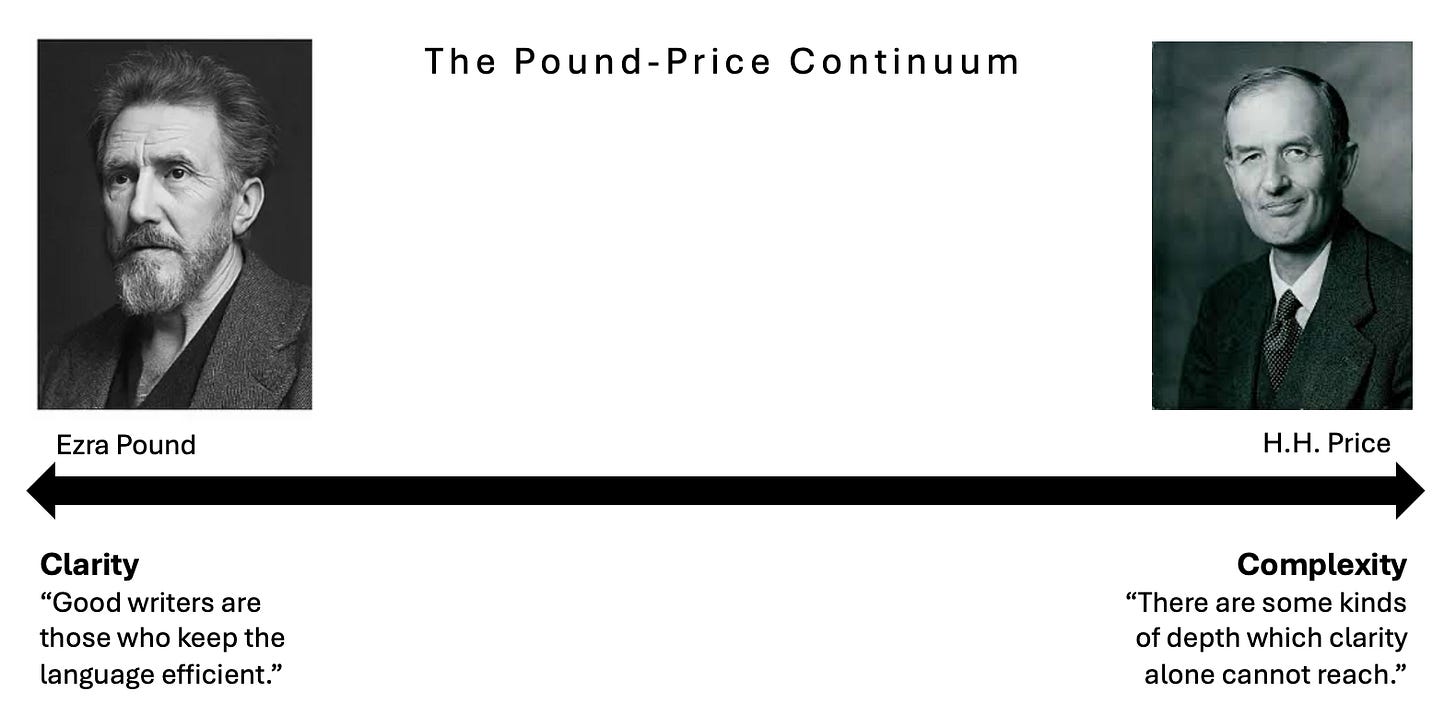Consider these two statements:
Good writers are those who keep the language efficient. That is to say, keep it accurate, keep it clear.
Ezra Pound, ABC of Reading
Clarity is a great virtue, but not the only virtue. There are some kinds of depth which clarity alone cannot reach.
H.H. Price, Clarity is Not Enough
We can think of the struggle between clarity and complexity as the Pound–Price Continuum. If Pound demands that writers make language “accurate” and “clear,” treating clarity as the highest virtue, the philosopher H.H. Price warns that some truths are too complex or subtle to survive in simple, polished prose. At one end, language cuts clean; at the other, it wrestles with mystery. 1
While this continuum might offer a useful way of thinking about the tension between clarity and depth, framing them as opposite ends of a line risks creating a false dichotomy. Are clarity and complexity in conflict? Can the deepest insights be expressed with surprising simplicity Does dense, difficult language mask a lack of real thought?
I’ve always been of the opinion that saying what you mean clearly, precisely and with only the smallest serving of word salad is something of a boon to understanding, but it would appear that to some such writerly virtues actually reduce meaning.
In a 1944 lecture, Price critiqued the prevailing emphasis on linguistic clarity within analytic philosophy. He targued that an overemphasis on clarity could lead to the neglect of complex and significant philosophical issues that resist straightforward analysis. As he puts it, “Obscurity may sometimes be a necessary price to pay for profundity.”
Can it really be true that there are some very important things which cannot be clearly articulated?
In his 1986 monograph, Writing with precision, clarity, and economy, magazine editor Dick Mack was at pains to point out that “verbiage, obscurity, and imprecision in manuscripts slow the editorial process and ultimately hamper communication.” This matters because if we go to the trouble of writing, we probably want our thoughts both to serve some sort of purpose and to be remembered. What’s memorable is “…clear, brief, and forceful. No one would willingly consign his work to obscurity, but we do so with imprecise, ambiguous, and verbose manuscripts.”
In the prologue to Plain Words, Ernest Gowers puts the problem like this:
The fault of bad writing is not that it is unscholarly but that it is inefficient. It wastes time: the time of the readers because they have to puzzle over what should be plain, and the time of the writers because they may have to write again to explain their meaning. A job that needed to be done only once has had to be done twice because it was bungled the first time.
Why do we end up with so much “bungled” writing? Well, as Terry Leahy explains, “Trying to express complex thoughts in simple English… is demanding, challenging and takes time.”2 In order to be clear, precise and economical you need to know your subject matter inside out and work hard to help others understand what you know. In contrast, if you want to conceal your own lack of understanding then it probably helps to obscure and obfuscate your meaning behind a veil of critical theory and postmodernism, or, to put it more forcefully, bullshit.
Keep reading with a 7-day free trial
Subscribe to David Didau: The Learning Spy to keep reading this post and get 7 days of free access to the full post archives.





